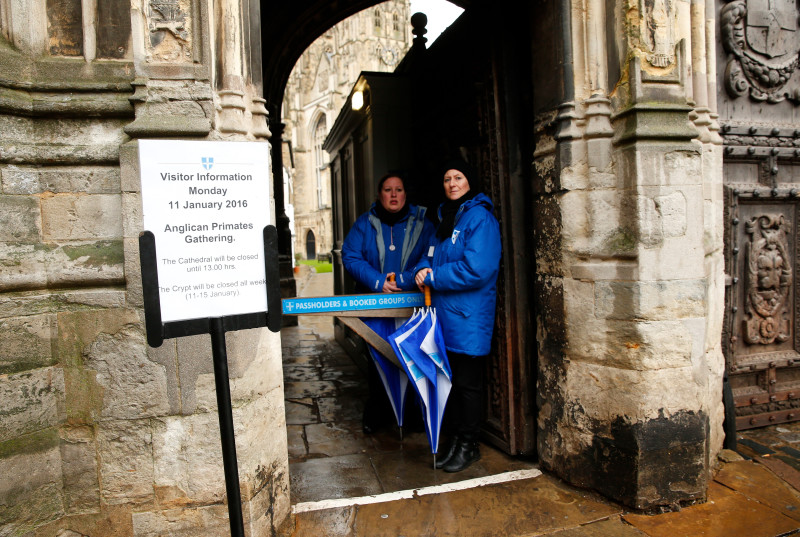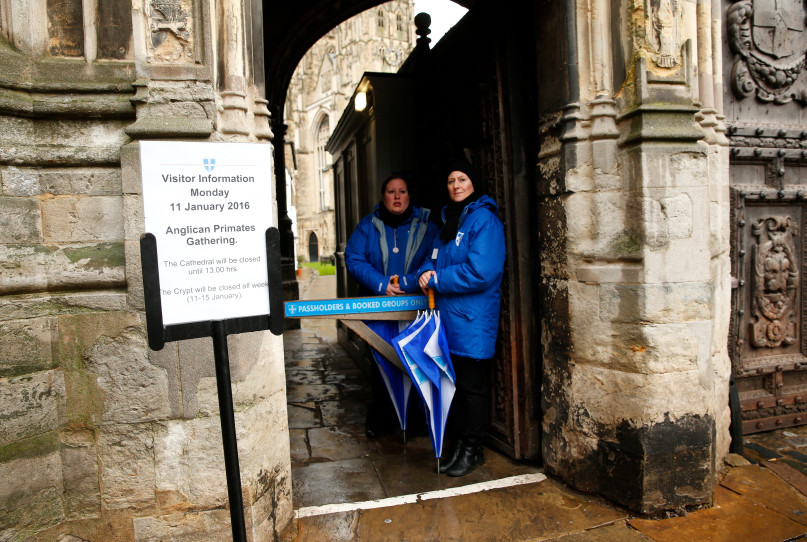
Two guides stand behind tape at Canterbury Cathedral which is closed due to the Primates of the Anglican Church meeting, in Canterbury, January 11, 2016. REUTERS/Eddie Keogh.
The ‘Splainer (as in “You’ve got some ‘splaining to do”) is an occasional online feature in which RNS staff give you everything you need to know about current events to hold your own at the water cooler.
(RNS) The Anglican Communion has voted to suspend the Episcopal Church, its American branch, from participating in decision-making and governance for three years. The move came in a private meeting of Anglican leaders in Canterbury, England and is designed to send a message — Anglicans feel the decisions Episcopalians have made regarding gay clergy (they got ’em), same-sex marriage (they do ’em) are out of line with what the the majority of Anglicans consider Christian doctrine.
Q: What is the relationship of the Episcopal Church to the Anglican Communion?
A: The Episcopal Church is one of 44 member churches that make up the Anglican Communion, most of which trace their roots to the Church of England, which broke from Rome in 1534. History buffs and viewers of PBS’s “Wolf Hall” will remember that Henry was upset over another marriage — his to Queen Catharine of Aragon, which Rome would not dissolve so he could marry his mistress, Ann Boleyn. Today, the Anglican Communion represents about 85 million Christians in 165 countries. The Episcopal Church has 109 dioceses in the U.S., Asia, the Pacific, Latin America, the Caribbean, and Europe. It claims just over 2 million members, the vast majority of them (1.8 million) in the U.S. Over one-half of the signers of the Declaration of Independence were Episcopalian.
The Anglican Communion has no authority over its member churches, each of which governs itself. It has no pope, like Roman Catholicism, but considers its “primates,” as leaders are called, equal. The Archbishop of Canterbury, Justin Welby, is considered “first among equals.” Michael Curry is the newly-installed Presiding Bishop of the Episcopal Church and is attending the conference.
Q: What’s rocking the Anglican boat? Why can’t they all just get along?
A: Like many other Christian denominations, the Anglican Communion is divided on the question of homosexuality within the church. In 1976, Episcopal Church officials voted to affirm homosexuals as “children of God,” and the following year ordained their first gay priest. A quarter of a century later, it ordained Gene Robinson as the first openly gay bishop — and that’s when things heated up. Anglican leaders met, issued a warning statement against Robinson’s consecration. Robinson wore a bullet-proof vest beneath his vestments at the ceremony. Six U.S. dioceses left the Episcopal Church and aligned themselves with member churches as far away as Nigeria. That kicked off ongoing litigation about what those formerly-Episcopal churches do and do not own among church property.
Since then, almost every large Anglican and Episcopal meeting has included some discussion of the Episcopal Church’s relationship to the broader communion. Can it continue? Will it continue? Or will the Episcopal Church separate from the Anglican Communion? The discussion intensified when, in early July — only a few days after the Supreme Court made same-sex marriage the law of the land — Episcopal Church leaders voted to permit their clergy to perform same-sex marriages. Justin Welby’s response: the decision “will cause distress for some and have ramifications for the Anglican Communion as a whole, as well as for its ecumenical and interfaith resolutions.”
Q: How do the “sides” in the debate break down?
A: Conservative Anglicans who oppose the Episcopal Church’s acceptance and affirmation of homosexuality can generally be found in the Fellowship of Confessing Anglicans, and in Global Anglican Fellowship . Together, they claim to represent two-thirds of the world’s Anglicans. They reject same-sex marriage and practicing gay clergy. Only the Episcopal Church ordains gay clergy and performs same-sex marriage. The Anglican Church of Canada currently blesses same-sex unions and will take up the question of performing same-sex marriages this summer. Some of its dioceses permit the ordination of openly-gay clergy. Many conservatives at this week’s Canterbury meeting lamented that the sanctions did not go far enough because they did not also include the Canadian branch of the communion.
Also with the conservatives is the Anglican Church in North America, formed after the installation of Gene Robinson and now claiming 1,000 member churches. More significantly, its archbishop, Foley Beach, participated in the Canterbury meeting, despite the fact his denomination is not a voting member of the communion. Anglican watchers like Jeffrey Walton at the Institute on Religion and Democracy think that means the Anglican Church of North America is closer to becoming a more important player in the broader communion. “There is now an understanding that the Episcopal Church is no longer the only authentic expression of Anglicanism in North America,” Walton said. “Basically, a decision has been made that the Anglican Church in North America will be officially a part of this family and this conversation.”
Q: What happens now?
A: The sanctions imposed on the Episcopal Church are for three years. Near the end of that period, Episcopalians will convene at their triennial “general convention,” and its a sure bet they will craft their official, denominational response. As to what that will be, Anglicans have different ideas. Some in the broader communion hope the Episcopal Church will change its ways. But many Episcopal leaders say there is no going back. Schism may be on the horizon.






